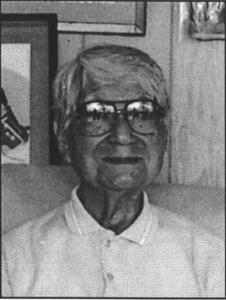Riichi Hatada

Tsunamis Remembered: Oral Histories of Survivors and Observers in Hawai‘i
Life history interviews with individuals who witnessed and survived tsunamis-particularly the 1946 and 1960 disasters on the Big Island of Hawai'i. Thirty individuals-mostly residents of Hilo and Laupahoehoe-recall their experiences before; during, and after the 1946 and 1960 tsunamis which were arguably the most destructive natural disasters in modem Hawaiian history.
Riichi Hatada, the fourth of eight children, was born on April 21, 1922 in downtown Hilo to Japanese immigrants Shigemi Tasaka Hatada and Kenho Hatada. His father waited on tables at the Pacific Bakery Hotel and Restaurant where he eventually learned the bakery trade. In ca. 1925, his father founded K. Hatada Bakery in the Shin.machi section of Hilo where the family resided. The bakery produced Star Bread. The bakery was later sold to the Ikedas who owned Hilo Macaroni Factory. During that time his father returned to Hiroshima to build a family home. Upon his return to the islands, his father was employed by the Hilo Macaroni Factory. When be accumulated sufficient capital, he again started K. Hatada Bakery which produced Purity Bread. The K. Hatada Bakery enterprise, which at one time distributed Love's products and included Robert's Bakery, served Hilo residents for decades. Riichi Hatada attended Waiakea Kai, Hilo Intermediate, and Hilo High schools. He started working at the family-run bakery prior to his graduating in 1941; he continued to work there until it was sold in 1993. He and Eiko Hayashida Hatada have been married for flfty years and have raised three children. The K. Hatada Bakery was destroyed in the 1946 tsunami. The bakery, hit by a caboose propelled by the tsunami, was only half salvageable. The family subsequently re-established K. Hatada Bakery on K\ikiiau Street where it survived intact the 1960 tsunami. The interview was conducted in his Hilo home.
Scope and Content Note
A baker's son details bakery operations. He recalls fishing and other activities on the Wailoa River in Shinmachi. The effects of World War II restrictions and military influx on the Hilo community are discussed. From the top of the Coca-Cola building, he witnessed the destructive power of the 1946 tsunami, which carried a caboose into the bakery, tearing it in half.
Program Note:
This interview is part of the Center for Oral History's project Tsunamis Remembered: Oral Histories of Survivors and Observers in Hawai‘i. Interviews from this project are available in the Center's ScholarSpace open access repository.
The Center for Oral History (COH), in the Department of Ethnic Studies at the University of Hawaiʻi at Mānoa, collects, documents, preserves and highlights the recollections of Native Hawaiians and the multi-ethnic people of Hawaiʻi. It produces oral histories and interpretive historical materials about lifeways, key historic events, social movements and Hawaiʻi’s role in the globalizing world, for the widest possible use.
Please Note: The oral histories in this collection are protected by copyright and have been created for educational, research and personal use as described by the Fair Use Doctrine in the U.S. Copyright law. Please reach out Voices@noaa.gov to let us know how these interviews are being used in your research, project, exhibit, etc. The Voices staff can help provide other useful resources related to your inquiry.
The NOAA mission is to understand and predict changes in climate, weather, oceans, and coasts, to share that knowledge and information with others, and to conserve and manage coastal and marine ecosystems and resources. The Voices Oral History Archives offers public access to a wide range of accounts, including historical materials that are products of their particular times, and may contain offensive language or negative stereotypes.
Voices Oral History Archives does not verify the accuracy of materials submitted to us. The opinions expressed in the interviews are those of the interviewee only. The interviews here have been made available to the public only after the interviewer has confirmed that they have obtained consent.
